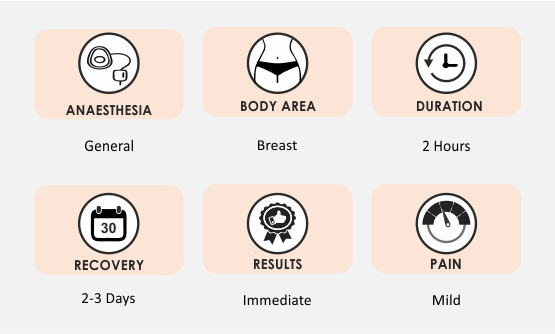Breast tissue in the axillary (underarm) area is called axillary breast fat. A fatty tissue hangs around the armpit which is very discomforting for females both cosmetically and symptomatically. This condition is quite common and can affect people of any gender, but it is more commonly seen in women assigned female at birth.
Breast tissue that grows outside the typical breast limits, frequently into the underarm region, is called axillary breast tissue.
This tissue may be made up of glandular tissue, fatty tissue, or both. Due to hormonal changes that may cause it to expand, it might vary in size and form and may become more apparent during puberty, pregnancy, or nursing.

If you have worries about axillary breast tissue or if it makes you uncomfortable or affects your self-esteem, you should speak with Dr Anmol Chugh, a Board certified plastic surgeon in India. Based on your unique circumstances and preferences, he can advise you on the best treatment options for you.
What is Axillary fat pad removal?
Axillary fat pad removal, sometimes referred to as axillary liposuction or axillary breast fat removal, is a cosmetic surgical treatment used to remove extra fat from the axillary (underarm) region. People who have prominent fat deposits under their arms that may create discomfort or cosmetic issues frequently seek this surgery.
Also, you can check out some very important videos on axillary breast fat removal and how Dr. Anmol Chugh approaches treatment.

Dr. Anmol Chugh is a Board Certified Plastic Surgeon
Dr. Anmol Chugh is a Board Certified Plastic Surgeon with an experience of more than 14 years and 10000+ surgeries. He has performed more than 1100 Breast Augmentation surgeries and has been at the forefront of bringing the latest surgical technologies to his clientele spanning across the globe.
What causes Axillary breast fat?
Although the precise etiology of axillary breast tissue is unknown, it is thought to be a product of the mammary glands’ embryological development.
The following are some causes and motivating elements for the growth and prominence of axillary breast tissue:
- The development of an embryo:
- Changes in hormones
- Genetics
- Gaining weight
- Conditions linked to hormones
- Aging
Axillary fat pad removal Treatment
Treatment Options to Remove Axillary Breast Tissue
The size, pain, and aesthetic issues related to the problem are often taken into account while determining the best course of action for axillary breast tissue removal.
The following are some typical methods for treating axillary breast tissue:
Breast Fat Surgical excision:
For those who experience pain, discomfort, or aesthetic difficulties, surgical removal of axillary breast tissue, also known as axillary breast tissue excision, is a common and successful therapeutic option.
An incision is made in the axillary region, extra tissue is cut off, and then the incision is stitched up. Depending on the size and location of the tissue, a different surgical approach may be performed.
Under general or local anesthesia, this procedure is normally carried out by a plastic surgeon or breast surgeon, and it is frequently done as an outpatient procedure.
Liposuction:
This procedure may be used to get rid of extra fatty tissue in the axilla. It involves inserting a tiny tube (cannula) to suction out fat, which is less invasive than surgical excision. Liposuction is typically better suited for people with axillary tissue that is primarily fatty rather than glandular.
Combination techniques:
If there is both fatty and glandular tissue present, a combination of surgical excision and liposuction may be used to get the best results.
Axillary Breast Fat Surgery in Gurgaon
In this surgical video, you can see that this female patient is both visually and symptomatically bothered by a fatty tissue that hangs about her armpit area.
Axillary breast or arm pit fat is a common problem amongst ladies.
You can speak with us if you suffer from the same axillary breast fat condition.
Axillary Breast Tissue Removal Recovery
The extent of the procedure, the surgical technique used, and individual factors can all affect how quickly you recover after having your axillary breast tissue removed (also known as having your axillary breast tissue excision).
The following are some causes and motivating elements for the growth and prominence of axillary breast tissue:
- You are advised to take a 5-day days of antibiotic course as per your doctor’s suggestion.
- Wear compression garments for 4 to 6 weeks, depending on the fat pad.
- Avoid any kind of heavy exercise or movement for at least 4 weeks.
- Avoid any kind of alcohol and smoking consumption for a quick recovery.
It’s important to carefully follow your surgeon’s postoperative instructions and show up at all scheduled follow-up appointments because recovery times can vary from person to person. Contact your surgeon right away if you experience any unusual symptoms, such as worsening pain, infection symptoms, or other worries.
Happy experience| Axillary fat pad Removal
Real Patient Results

Bilateral Axillary Fat removal-44 year old female – 1 month post op

FAQS
- The complexity of the procedure
- The surgeon’s standing and level of training and experience
- The type of anesthesia
- and the Treatment facility’s location can all have an impact on this range
Schedule Your Consultation

Free E‑Book
Refine Your Reflection
Begin Your Wellness Journey
Get your free Essential Wellness Guide crafted by Dr. Anmol Chugh. Simple tips. Real science. Everyday beauty.